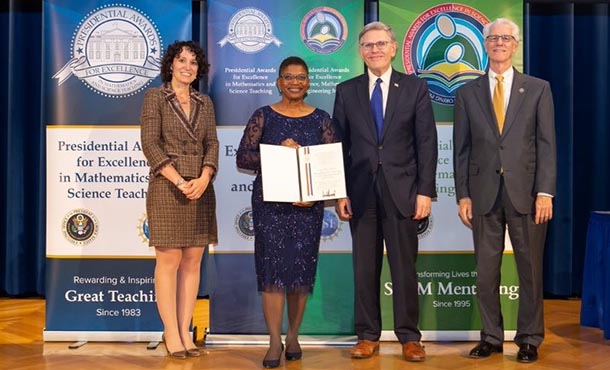
Amy Freeman (second from left), director of the Penn State Millennium Scholars Program and the previous assistant dean for outreach and inclusion in the College of Engineering, was awarded the Presidential Award for Excellence in Science, Mathematics and Engineering Mentoring. Others pictured (left to right): Karen Marrongelle, assistant director of the Directorate for Education and Human Resources with the National Science Foundation; Kelvin Droegemeier, director of the White House Office of Science and Technology Policy; and F. Flemming Crim, chief operating officer for the National Science Foundation. IMAGE: THE WHITE HOUSE
Millennium Scholars director receives presidential honor for STEM mentorship
Penn State's Amy Freeman is one of 15 individuals nationwide to receive Presidential Award for Excellence in Science, Mathematics and Engineering Mentoring
12/19/2019
By Ashley J. WennersHerron
UNIVERSITY PARK, Pa. — Amy Freeman — director of the Penn State Millennium Scholars Program; associate research professor in the School of Engineering Design, Technology, and Professional Programs; and the previous assistant dean for outreach and inclusion in the College of Engineering — was recently recognized with the highest national honor a person can receive for providing mentorship in science, mathematics and engineering. One of 15 individuals from across the country to receive the Presidential Award for Excellence in Science, Mathematics and Engineering Mentoring, Freeman was the only recipient in the commonwealth of Pennsylvania.
Freeman was nominated for her work in the Center for Engineering Outreach and Inclusion (CEOI), where she worked to help undergraduate and graduate students stay at Penn State and earn their degrees. She completes similar work in the Millennium Scholars Program, where she helps students, from their first year of undergraduate work, stay on a path toward earning a doctorate.
“My goal has always been to ensure that in the future, the scholarly community is made of a wide array of different minds,” Freeman said. “It takes recognition such as this for me to take pause and realize that the future is better because I helped someone earn their degree.”
In 1982, Freeman was the first woman to earn a bachelor’s degree in construction management at Washington State University. In 1991, she was the second woman — and the first black woman — to earn a master’s degree from Penn State’s Department of Architectural Engineering in the construction management option. In 2009, she received her doctorate in workforce education from Penn State with a focus on engineering education.
“When I was a student in my undergraduate and graduate programs, I was the only one like me,” Freeman said. “I used to joke with my students that, as an undergrad, if I wanted to attend the National Society of Black Engineers, I would have to talk to the image in the mirror because it felt like it was just me. There was no NSBE at Washington State University then, nor could I have imagined such an incredible organization.”
Freeman recently attended a conference of the National Society of Black Engineers, which has an organizational goal of helping 10,000 black students graduate annually with engineering degrees by 2025.
“It was a sea of African American faces; thousands of them,” she said. “And they were engineering students, so I understood that every single one of them knew calculus. That’s something I would’ve paid good money to see when I was a first-year student. I looked at those faces, and I saw progress.”
The progress is the result of Freeman’s work to support underrepresented students in science, technology, mathematics and engineering fields, along with what she calls the collaborative efforts of hundreds of colleagues.
During her time at the CEOI, Freeman refined and implemented several intervention programs to help students succeed in their academic careers. One such program was Pre-First Year in Science and Engineering (PreF), which, to this day, provides a six-week summer bridge experience for incoming first-year students in engineering or science majors to transition to a collegiate environment. While the program had already been in place for over a decade when Freeman joined the CEOI, she worked to hone how students built their academic community with the goal of that community lasting at least until they earned their degree.
“There are a variety of different means to help create community to ensure students complete their program successfully,” Freeman said. “And that’s the goal — to use all of your tools to ensure that everyone has access to the engineering profession. If we have a larger variety of people in engineering, the more solutions we will have to society’s greatest challenges of providing clean water, developing infrastructure and much more.”
Freeman worked closely with Judith Todd, P.B. Breneman Chair, head of the Department of Engineering Science and Mechanics, and professor of engineering science and mechanics in the College of Engineering, who nominated her for the award in 2016. Todd won the award herself in 2006.
“I watched Amy build a fledgling program to preeminence while she also engaged alumni, industry, government and external constituencies to ensure its success,” Todd said. “Most importantly, she always put student success as her highest priority. She built a multicultural community that continues to thrive.”
The PreF program served as the model Freeman used to implement seven other summer bridge programs at Penn State, always with the goal of creating community for students. Freeman has also created and implemented other initiatives that have provided internship opportunities and engaged students in international scholarship across three continents.
“We know from research that students do better when they aren’t alone,” Freeman said. “They’re more likely to form study groups; they’re more likely to study abroad; they’re more likely to finish their degrees.”
The Millennium Scholars Program’s mission matches Freeman’s mission: It aims to produce a community of STEM scholars who will actively engage as innovative leaders in society.
“The future looks extremely bright, and great things await,” Freeman said.

